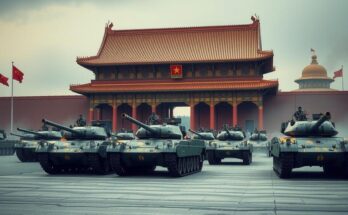Extremist Islamist forces have captured large areas of Aleppo, raising concerns for U.S. policy in Syria. The takeover of sensitive sites, including potential chemical weapons facilities, poses risks to Israeli security. These developments represent a significant defeat for Assad and his allies. Expert opinions stress the danger posed by groups like Hayʼat Tahrir al-Sham, which have ties to Al-Qaeda and seek to influence the region.
JERUSALEM—In a surprising turn of events, extremist Islamist forces in Syria have gained control of significant portions of Aleppo, prompting serious concerns for U.S. policymakers regarding the ongoing conflict in the country. Jason Brodsky, policy director for United Against Nuclear Iran, warned that the possibility of these anti-Assad elements seizing sensitive installations, particularly the Syrian Scientific Studies and Research Center housing chemical weapons, poses a threat to Israeli security. The recent military success against President Bashar Assad represents a disappointing defeat for his regime and allies, including Hezbollah and Iran, according to experts.
Former President Barack Obama’s controversial 2013 agreement to eliminate Assad’s chemical weapons has been called into question, especially as evidence suggests that Assad may still retain capabilities for chemical warfare. With approximately 900 U.S. troops currently deployed in Syria to combat the Islamic State, their presence is also aimed at mitigating Iranian influence in the region. The takeover of Aleppo raises alarming implications for U.S. interests, especially regarding groups like Hayʼat Tahrir al-Sham (HTS), a coalition of radical Islamist factions with ties to Al-Qaeda.
Phillip Smyth, an Atlantic Council expert, indicated that HTS resembles a group aspiring to a Taliban-like governance model, raising concerns about their potential objectives. The rise of HTS threatens not only the established order in Syria but also the position of the Syrian Democratic Forces (SDF), which includes Kurdish elements that crucially contributed to the defeat of the Islamic State. Wladimir van Wilgenburg highlighted the notable Kurdish enclaves in Aleppo, where tensions may increase between HTS and the SDF, further complicating the dynamics in the region.
The Iranian military and allied forces have acknowledged ongoing struggles with the escalating power of HTS, with an Iranian military advisor stating that resistance networks have been organized against foreign meddling in Syria. Amid South American turmoil, the Syrian regime’s military has reported significant troop losses during HTS’s advances in Aleppo, marking a new chapter in an already protracted conflict.
The control of Aleppo by extremist Islamist forces signifies a critical and volatile shift in the Syrian conflict landscape. This event not only raises strategic concerns for U.S. interests, reflected in the ongoing presence of American troops in the region, but also threatens regional stability, especially for Israel. The historical context, including past international agreements regarding Syria’s chemical weapons, coupled with the role of various factions such as HTS and the SDF, underscores the complexity of the conflict and the significant implications for both local and international stakeholders. The Syrian civil war, having persisted since 2011, has resulted in the death of over 500,000 individuals, leading to critical humanitarian crises and unprecedented levels of displacement. This backdrop of violence and instability further complicates the efficacy of any foreign policy approaches adopted by the U.S. and its allies.
The recent developments in Aleppo reveal significant threats not only to the Assad regime but also to broader U.S. foreign policy in the Middle East. The emergence of HTS and the regained strength of various anti-Assad factions complicate an already complex political and military landscape. With the ongoing U.S. military presence in Syria aimed at countering the Islamic State and influencing Iranian ambitions, the continuing instability in Aleppo has profound implications for regional security and U.S. interests.
Original Source: www.foxnews.com




